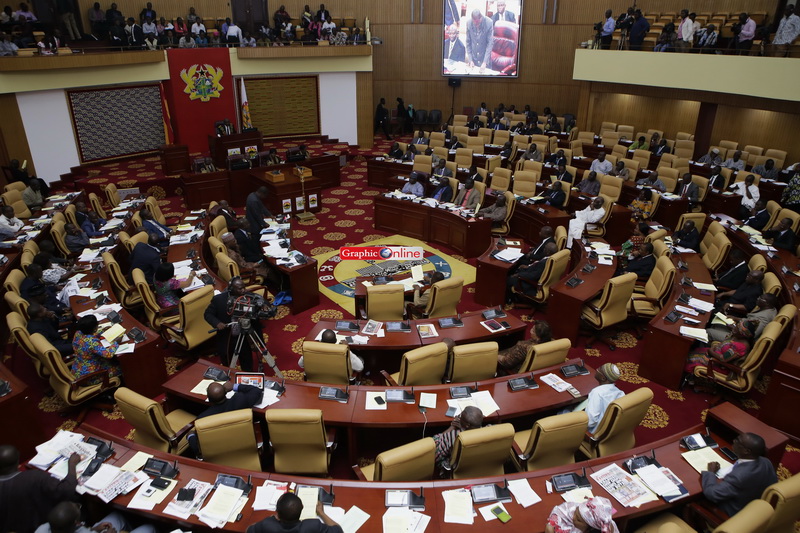Majority and Minority Members of Parliament (MPs) on Thursday engaged in a legal tussle over the constitutional backing for the establishment of the Office of the Special Prosecutor.
While the Minority MPs argued that the creation of the office required the amendment of the Constitution, the Majority legislators insisted that current provisions in the Constitution allowed for the establishment of such an office.
The debate followed the motion moved by the Attorney General and Minister of Justice, Ms Gloria Akuffo, for the Office of Special Prosecutor Bill, 2017, to be read the second time.
The object of the Bill is to establish the Office of the Special Prosecutor as a specialised agency to investigate specific cases of corruption involving public officers, politically exposed persons, and persons in the private sector involved in the commission of corruption and to prosecute the offences on the authority of the Attorney-General.
After the debate, the Bill was read the second time. This means that it would go through the amendment stage before it is read the third time and passed.
Minority’s legal arguments
Giving the concluding argument, the Minority Leader, Mr Haruna Idrissu, said the National Democratic Congress (NDC) minority and the NDC as a political party, in principle, would support every effort to fight corruption because it perpetuated inequality and poverty and could hinder the country’s progress.
Besides, he said, it was important to elevate the debate beyond petty partisanship because corruption did not know party colours.
Mr Idrissu said the Bill focused on Article 88(4) which dealt with the delegation powers of the Attorney General and left out 88(3), which stipulates that :”The Attorney General shall be responsible for the initiation and conduct of all prosecution of criminal offences.”
Therefore, he said, the Bill for the creation of a Special Prosecutor with powers to prosecute cases was flawed.
Bill pregnant with flaws
According to Mr Idrissu, the bill was pregnant with constitutional flaws and, therefore, could only give birth to an illegality called a Special Prosecutor.
Mr Idrissu faulted the procedure for the submission of the Bill since it sought to amend the Constitution through the back door.
“We are using a Bill to amend a Constitution. We are not saying that you cannot appoint a Special Prosecutor, but we are questioning the procedure of this process. If you want it, amend the Constitution appropriately.
“This Bill is seeking a backdoor amendment of Article 88(3). That procedure we object to,” he said.
Mr Idrissu said per the long title of the Bill, the Special Prosecutor would prosecute on the authority of the Attorney General.
“What is it that the Special Prosecutor will and can do that the Attorney-General cannot be vested with the authority to do by virtue of Article 88 of the Constitution”, he wondered.
Influence or independence
On the question of influence or independence, the Minority Leader said, it was the same President who appointed the Attorney General who would appoint the Special Prosecutor.
Besides, he said, the principle of prosecutorial independence was defeated in the Bill “because it says on the authority of the Attorney General.”
Mr Idrissu said Parliament could not proceed with the Bill without amending the Criminal Code of Ghana since it had to do with the Criminal Offences Act.
He raised a red flag over the provision in the Bill that allowed the Special Prosecutor to intercept communication of accused persons and indicated that it was against the tenets of the Constitution.
The MP for Bawku Central, Mr Mahama Ayariga, said he did not see any difference between the role of the Special Prosecutor and that of the police and state prosecutors.
He suggested that the investigative institutions should rather be resourced and given incentives to investigate and prosecute cases.
Majority’s defence
The Majority Leader, Mr Osei Kyei-Mensah-Bonsu, said the search for freedom, probity, justice and accountability was a collective resolve of all Ghanaians.
Therefore, he said, it was important for all to support the creation of the Office of a Special Prosecutor since it was meant to seek probity and accountability.
Mr Kyei-Mensah-Bonsu said Article 88(3) and Article 88(4) provided for delegation of powers by the Attorney General.
Delegation of powers
He said the delegation of powers to the Special Prosecutor, was to give the officer greater focus in the fight against corruption.
Mr Kyei-Mensah-Bonsu dismissed the suggestion that when prosecuting officers received better incentives, it would prevent them from compromising their investigations.
He said what was required of the officers was moral uprightness since it was impossible for the state to provide them with “enough financial incentives.”,
Mr Kyei-Mensah-Bonsu said the Bill was not a perfect document, and urged MPs to work as a team to improve it.
“If we want to fight corruption, we have to show effort. Lets decapitate the monster,” he said.
The MP for Tempane and Deputy Attorney General, Mr Joseph Dindiok Kpemka, said several institutions had existed in the country but the fight against corruption was not yielding any results.
Therefore, he said, the creation of a Special Prosecutor would go a long way to “consume the monster” called corruption.
Source: Daily Graphic



